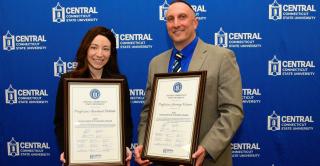
Due to new accreditation standards for Professional Athletic Training programs, as of 2020 the B.S. in Athletic training will no longer be offered at Central. It will be replaced by a 3+2 program that leads to an M.S. in Athletic Training. Students may begin their undergraduate studies in the B.S. Exercise Science program and start their M.S. Athletic Training coursework in their 4th year. Students successfully following this track will earn both their B.S. in Exercise Science and their M.S. in Athletic Training in just 5 years total.
The faculty of the Athletic Training Education Program strives to provide the students with the necessary theoretical and practical knowledge needed to enter the profession and to pursue advanced study in athletic training or related allied health professions. At Central Connecticut State University, importance is placed on the program's commitment to quality classroom instruction and providing ample opportunities for the development of the athletic training student's practical skills through clinical contact with the student-athletes of the university, while under the supervision of a certified athletic trainer. The athletic training faculty places emphasis on the student's analytical skills, problem-solving abilities, and the performance of practical skills during the athletic training student's clinical rotations in a coeducational setting.
Central Connecticut State University's Athletic Training Education Program is housed in the Department of Physical Education & Human Performance and grants a Bachelor's of Science Degree in Athletic Training. The Athletic Training Education Program is designed to prepare the student to assume the role of an entry-level athletic trainer upon graduation and successful completion of the Board of Certification (BOC) Examination.
PERFORMANCE DOMAINS
The athletic training coursework is designed to meet the five major tasks comprising the role of the certified athletic trainer as determined by the BOC.
- Injury/Illness Prevention & Wellness Protection
- Clinical Evaluation & Diagnosis
- Immediate & Emergency Care
- Treatment, Rehabilitation
- Organization & Professional Health & Well-Being
LEARNING OBJECTIVES
Upon successful completion of the academic coursework and clinical field experiences the student will meet the following learning objectives through demonstration of knowledge, analyzing and decision making; practical application of learned skills; and essential communication skills that of an entry-level athletic trainer.
- Knowledge (Cognitive)
- Demonstrate the acquisition of knowledge and understanding necessary for the safe practice as a health care professional in the areas of prevention, clinical evaluation, diagnosis, immediate care, treatment and rehabilitation.
- Demonstrate the ability to document findings of initial evaluations, management plans, and referrals.
- Knowledge (Skills and Application)
- Demonstrate the acquisition of the established necessary skills that are the basis for clinical proficiency.
- Demonstrate the ability to investigate, integrate concepts and problem solve in order to communicate the assessment findings to the patient and other health care team members.
- Demonstrate the ability to use comprehensive therapeutic judgment and the ability to identify modifying influences or deviations from the norm.
- Practice Ethically, Professionally and Compassionately
- Demonstrate the ability to provide health care services of an athletic trainer to a variety of patient populations without prejudice to age, activities, gender, and social or cultural difference.
- Demonstrate the ability to function as a health care provider during challenging situations by remaining composed and professional, while affording quality compassionate care to the patient.
- Practice confidentiality and abide by professional ethical standards of the profession.
- Professional Development and Collaboration
- Practice with the intent to advance personal professional knowledge and clinical skills by remaining current in the profession through participation in seminars and research, in order to best serve the patient population through the practice of evidence-based medicine.
- Participate in advocating the athletic training profession through engagement with local community events by volunteering time and professional skills.
- Practice with a commitment to share the knowledge and skills of the athletic trainer in support of joint collaboration efforts that lead to improving the quality of patient care.
ASSESSMENT PLAN
Practical knowledge and application of clinical skills will be assessed through examinations, skill testing, practical examinations, clinical experience documentation and evaluation.
Analyzing and problem solving will be assessed through examinations, group discussions, practical examinations and clinical decision-making.
Communication skills will be assessed through course presentations and clinical interactions with patients, preceptors, athletic training staff members, coaches, and team physicians.
Professional Development and collaboration will be assessed through community service, volunteerism, presentations, and participation in-service training with other health care professionals.
Entry-level athletic training aptitude will be assessed through BOC examination results and student placement following graduation.
ATHLETIC TRAINING EDUCATION PROGRAM OVERVIEW
Historical Perspective
Central Connecticut State University has been educating students to pursue the profession of athletic training since 1966. Carl F. Krein, retired head athletic trainer, professor, and NATA Hall of Fame member established the athletic training internship program and developed it into a nationally known and respected curriculum. Today, the program continues to prepare the athletic training student for BOC certification as a CAATE accredited program. Since the program's founding, more than 300 individuals - undergraduate, graduate, and internship students have contributed to the overall achievements of the program.
We are extremely proud of our graduation placement record and the accomplishments of our graduates in becoming productive practitioners in the field of athletic training. Our alumni have successfully entered the athletic training profession at various levels: clinical, high school, preparatory school, colleges, university, as well as at the highest level of sports medicine, the professional ranks. Many of our graduates have also successfully pursued alternative careers in allied health, such as physical therapy, physician's assistant, medicine and chiropractic medicine.



